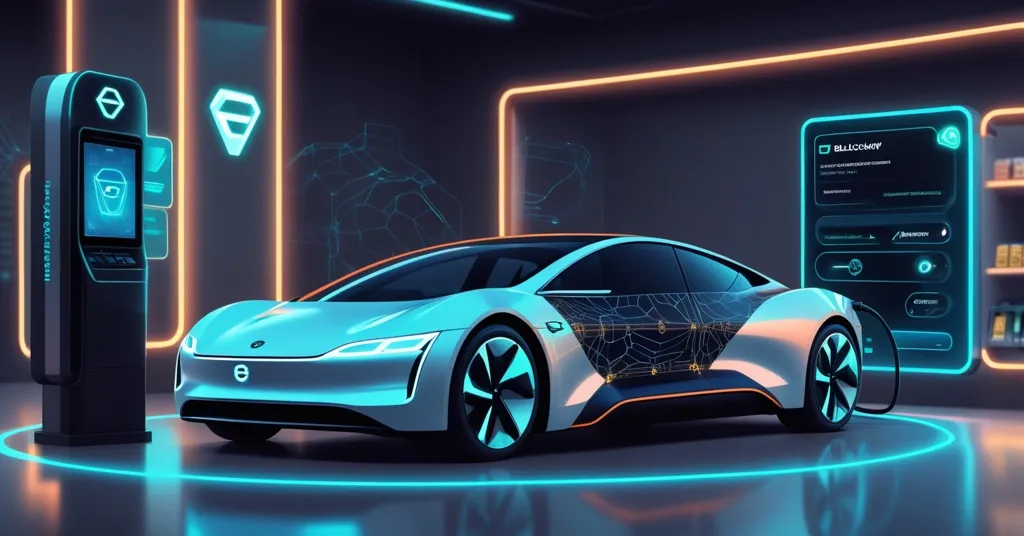Blockchain and Crypto Revolutionizing the Automotive Industry: Transparency and Payments Lead the Way

How Blockchain and Cryptocurrency Are Transforming the Automotive Industry
Blockchain and cryptocurrency are no longer just buzzwords for digital money—they’re infiltrating industries far beyond finance, including the automotive sector. From supply chain transparency to futuristic payment systems, decentralized tech is poised to redefine how cars are made, sold, and driven. Let’s explore this unexpected crossover and why it matters for the future of mobility and trust.
- Supply Chain Transparency: Blockchain’s role in tracking parts and materials for ethical and efficient manufacturing.
- Crypto Payments: Potential and pitfalls of buying vehicles with Bitcoin or stablecoins.
- Smart Contracts: Automating leasing and insurance with benefits and risks.
- Challenges Ahead: Scalability, regulation, and security hurdles in merging automotive with blockchain.
Why Automotive and Blockchain? A Perfect Collision
The automotive industry is at a tipping point. With electric vehicles (EVs) booming, autonomous driving on the horizon, and supply chain crises exposing deep flaws, there’s a desperate need for trust and efficiency. Enter blockchain—the decentralized, tamper-proof ledger technology behind Bitcoin and countless other cryptocurrencies. It’s not just about digital gold; it’s about reimagining systems of trust in industries riddled with opacity. For those of us championing decentralization and freedom, this intersection is a prime battleground to disrupt outdated, centralized structures. Let’s break down how blockchain and crypto are revving up to transform automotive from the factory floor to the showroom.
Supply Chain Revolution: Blockchain as the Trust Engine
Ever wonder where the cobalt in your EV battery comes from? The automotive supply chain is a labyrinth of thousands of suppliers across the globe, often plagued by fraud, counterfeit parts, and ethical nightmares like child labor in mining. Blockchain offers a solution by creating an immutable digital record of every transaction, shipment, and component. Scan a QR code on your car part, and you could see its journey from a mine in the Congo to the assembly line in Detroit—no middleman spin, just raw data on the chain.
Companies like IBM are already testing this with Hyperledger, a private blockchain framework, to track cobalt for EV batteries. Their pilot, partnered with firms like Volvo, aims to ensure ethical sourcing by logging every step of the material’s journey. While hard data on fraud reduction isn’t fully public yet (a transparency irony we’ll let slide for now), early reports suggest it’s building consumer trust—especially for eco-conscious buyers who want to know their Tesla isn’t powered by exploitation. For Bitcoin maximalists like me, this might seem like a detour from sound money, but it’s a killer use case for blockchain tech beyond BTC, solving real-world problems Bitcoin isn’t designed to tackle.
Counterpoint: this isn’t a silver bullet. Public blockchains like Ethereum struggle with the sheer volume of data needed for real-time supply chain tracking—think millions of transactions for a single car model. Plus, getting every supplier, from mom-and-pop shops to global giants, to adopt the tech is like herding cats. Still, the potential to cut fraud and inefficiency makes blockchain automotive supply chain transparency a goal worth chasing.
Crypto Payments on the Road: Dream or Dead End?
Imagine pulling up to a dealership, scanning a wallet QR code, and driving off with a new EV paid for in Bitcoin. Sounds badass, right? Cryptocurrency vehicle payments have been teased for years, most famously when Tesla briefly accepted Bitcoin in March 2021, only to reverse course by May over environmental concerns tied to mining energy use. Elon Musk’s flip-flop—let’s call it “Elon giveth, and Elon taketh away”—frustrated Bitcoiners and highlighted a core issue: BTC’s network isn’t built for quick, high-volume transactions like buying a car on the spot.
But let’s not write off crypto payments just yet. Stablecoins like USDC, pegged to the dollar for price stability, or layer-2 solutions on Ethereum (networks built atop main blockchains for faster, cheaper transactions), could smooth out the kinks. Smaller players are experimenting too—some luxury car dealers already accept crypto through payment processors like BitPay. Beyond purchases, tokenized assets could let you buy fractional ownership in a vehicle via non-fungible tokens (NFTs)—think digital deeds tradable online, representing a slice of a self-driving taxi fleet. Ethereum’s programmability makes this possible, filling a niche Bitcoin doesn’t touch.
Here’s the rub: volatility and regulation are massive speed bumps. One day your Bitcoin buys a Lambo, the next it barely covers a used Prius. Governments are also clueless on taxing or classifying these transactions—good luck explaining an NFT car share to the IRS. While I’m all for ditching banking middlemen, crypto payments in automotive are a long road ahead. No shilling, no moonshot hype—just cold reality with a dash of hope.
Smart Contracts: Efficiency or Overreach?
What if your car could lock you out for missing a lease payment? Welcome to the world of smart contracts—self-executing agreements coded on blockchains like Ethereum, where terms are enforced automatically without a middleman. In automotive leasing or insurance, this is a game-changer. Miss a payment? The contract remotely disables your car until you pony up. Crash your ride? Sensors report the damage to the blockchain, triggering an instant insurance payout, no adjuster needed. Startups in the InsureTech space are already piloting these models, cutting costs and red tape.
Think of a smart contract like a vending machine: insert payment, get product—no human cashier required. Ethereum and layer-2 networks like Polygon make this scalable for microtransactions, potentially revolutionizing how we handle car ownership. For decentralization fans, it’s a middle-finger to bloated bureaucracy. But let’s play devil’s advocate: do we really want code controlling physical assets like vehicles? Privacy hawks, including myself, see red flags. A hacked contract could brick an entire fleet—imagine a ransomware attack turning your commute into a dystopian lockdown. And who holds the keys to override? Some centralized dev team? That’s not the freedom I signed up for.
Historical hacks like the 2016 DAO exploit on Ethereum, where $50 million was siphoned due to a coding flaw, remind us these systems aren’t foolproof. Solutions like zero-knowledge proofs (tech that verifies data without revealing it) could protect privacy, but they’re not mainstream yet. Smart contracts for car leasing and insurance are a double-edged sword—efficient as hell, but a potential Pandora’s box for control and security.
Altcoins and Bitcoin: Complementary Forces in Automotive
Bitcoin remains the king of decentralized value storage, but let’s be real—it’s not built for the high-speed, data-heavy needs of automotive applications. Its Lightning Network, a layer-2 scaling solution, might one day handle microtransactions like EV charging fees, but we’re not there yet. This is where altcoins shine, filling niches BTC doesn’t touch. Ethereum’s smart contracts are already powering automotive experiments, while Polkadot’s focus on cross-chain interoperability could link disparate systems for autonomous vehicle data sharing. Even Cardano, with its energy-efficient consensus, offers potential for IoT integration in cars without the environmental guilt trip of older chains.
As a Bitcoin maximalist at heart, I’ll throw a jab—many altcoins carry centralization risks (looking at you, Ethereum post-Merge) and speculative baggage. But I can’t deny their utility in specialized use cases. The crypto revolution isn’t a one-coin show; it’s a messy ensemble of protocols pushing decentralization into real-world sectors like automotive. This isn’t about picking winners—it’s about recognizing how these tools collectively challenge the status quo.
Consumer Impact: What’s in It for You?
So, how does this tech trickle down to the average car buyer? Blockchain could mean lower costs if supply chain efficiencies reduce manufacturing overhead. Buying a used car? A blockchain-based history log could verify mileage, repairs, and ownership—no more shady dealers fudging odometers. EV owners might even earn tokens for charging at green stations, gamifying sustainability via crypto rewards. These aren’t pipe dreams; they’re early-stage experiments gaining traction.
On the flip side, adoption barriers could screw consumers short-term. If blockchain systems jack up production costs or if crypto payments face regulatory bans, guess who foots the bill? And privacy risks from smart contracts or IoT data on public ledgers could expose your driving habits to the highest bidder. It’s a tightrope between empowerment and exploitation—classic crypto territory.
Challenges Ahead: Scalability, Regulation, and Cyber Risks
Before we get too giddy, let’s slam the brakes on the hype. Blockchain in automotive faces a gauntlet of hurdles. Scalability is a nightmare—most public chains can’t handle the transaction throughput for real-time data like IoT sensors in connected cars. Bitcoin prioritizes security over speed, and even Ethereum’s gas fees, though better post-Merge, sting for tiny transactions. Good luck processing a Black Friday sale, let alone a million car parts.
Then there’s the regulatory swamp. Governments can’t even agree on taxing Bitcoin—now throw in tokenized car ownership or smart contract liabilities. The EU’s strict data privacy laws, like GDPR, clash with blockchain’s permanence; you can’t “forget” data on an immutable ledger. Cybersecurity is another beast. Hack a smart contract, and you could hijack a fleet—Hollywood dystopia meets Main Street. These aren’t theoretical; they’re looming threats needing urgent fixes.
Still, I’m a sucker for disruptive chaos. These challenges aren’t dealbreakers—they’re the growing pains of tech that could redefine trust in mobility. Effective accelerationism (e/acc) means pushing forward, flaws and all, to build something better. Blockchain’s automotive journey is messy, risky, and nowhere near ready—but that’s exactly why it’s thrilling.
The Road Ahead: A Decentralized Future?
While your car isn’t running on Bitcoin or paying out insurance in ETH just yet, the groundwork is being laid. Mass EV adoption, autonomous fleets, and tokenized car-sharing ecosystems could be catalysts for blockchain integration within a decade. Picture a future where your self-driving car negotiates charging fees via microtransactions on a decentralized network, or where ownership is a tradable NFT, not a dusty title deed. It’s speculative, sure, but grounded in trends we’re seeing now, even as major players like Renault face workforce reductions amid cost-cutting efforts.
As champions of decentralization, privacy, and freedom, we should cheer this push while staying brutally honest about the risks. The automotive industry, much like finance before it, is ripe for a trustless overhaul. Blockchain and crypto might not solve every problem, but they’re injecting much-needed disruption into a stagnant space. So, would you trust a smart contract to control your car’s access, or is that a bridge too far for privacy? Ponder that as we speed toward this wild, uncharted future.
Key Takeaways and Questions on Blockchain in Automotive
- How does blockchain enhance transparency in automotive supply chains?
Blockchain logs every step of a car part’s journey—from raw materials like cobalt for EV batteries to final assembly—on an unchangeable ledger, slashing fraud and ensuring ethical sourcing. Pilots by IBM with Hyperledger show this builds trust, especially for eco-conscious consumers. - Can cryptocurrency become a mainstream payment method for vehicles?
Early experiments like Tesla’s 2021 Bitcoin acceptance hinted at potential, but volatility, scalability, and regulatory uncertainty stall progress. Stablecoins and layer-2 networks may pave the way for smoother crypto vehicle transactions in the future. - What are the benefits and risks of smart contracts in car leasing and insurance?
Smart contracts automate agreements on platforms like Ethereum, cutting costs for leasing or insurance payouts. Yet, they risk privacy erosion (e.g., remote car locking) and cybersecurity threats, where hacks could disrupt ownership or safety. - Does Bitcoin have a direct role in the automotive sector?
Bitcoin’s focus on security and decentralization limits its use in high-speed automotive transactions or IoT. Its ethos of trustless systems inspires broader blockchain adoption, and Lightning Network could someday enable microtransactions like EV charging. - How do altcoins complement Bitcoin in automotive blockchain solutions?
Altcoins like Ethereum (for smart contracts) and Polkadot (for cross-chain data sharing) tackle specialized automotive needs—insurance automation, supply chain tracking—that Bitcoin doesn’t address, showcasing decentralized tech’s diverse impact.



